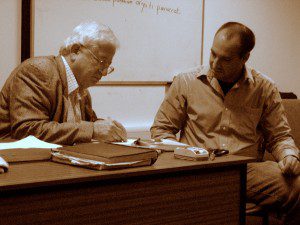I think I’m nearing the final stretch of an incredibly busy month or so, at last. I have submitted a chapter of my thesis (on Kant), which has been weighing on me for several months; I gave a talk in Oxford last Monday (great thanks again to Richard Gombrich and the OCBS, audio and some text to be posted when available); I had a wisdom tooth removed last Wednesday (great thanks to socialized medicine); and now I only have a poster to finalize and a paper to write for a conference this Friday/Saturday and a proposal to submit by Friday for this year’s AAR in Chicago…
Can I just say how much I am looking forward to Sunday? And to the 2 months of relatively deadline-free life to follow? And did I mention I am going to Thailand in May?
Yes, life is suffering; but not all the time, right?
~
In any case, here are three great podcasts that you should listen to (and feel free to discuss in the comments below).
In the first, and most recent, Robert Ellis talks with Ted Meisner of the Secular Buddhist about his perspective on Buddhism and what he considers to be its central insight: the ‘middle way.’ Robert and I have been in touch since around 2007/8 when I started my Ph.D. and I have always valued his writings and perspective on Buddhism and Western philosophy. One of the topics of his conversation with Ted is the fact that we all bring some of our own background beliefs and assumptions into our practice and understanding of Buddhism. This is indeed a good insight, and I have been trying more lately to be more ‘open’ with the fact that my background (mathematics, computer science, accounting, and Kantian philosophy) leads me to ‘see’ systems when I come to Buddhism. I wondered, however, if and how that insight might be reflexively applied to Robert; i.e. what from his background beliefs or assumptions led him to see the ‘middle way’ as the central insight of Buddhism?
I say that in recognizing that many will not see the middle way as all too central to Buddhism, though certainly important. Others have placed not-self at the heart of Buddhist though, others the goal of awakening, and yet others have said that Buddhism is essentially a teaching about the question of how best to live.
Also Robert sees ideas such as rebirth and enlightenment as having a ‘dogmatic basis’ and ‘in conflict with the middle way’ (mentioned at around 35:20 in the talk). As someone interested primarily in the Buddha as a thinker and teacher, I would wonder then how he managed to teach -or at least strongly suggest- these conflicting ideas. As I believe I have pointed out before, the Buddha certainly could have been a materialist (the philosophy existed in India in his time, he rejected it). But he wasn’t. And I have yet to see a good argument that he ‘really was a materialist’ and just taught rebirth and karma ‘as a skillful means’ or some such thing. (More on that no doubt in future posts.)
~

Next is an older lecture by Richard Gombrich, discussing Buddhism. It is a wonderful introduction to the religion, his own career, and Buddhist Studies at Oxford and beyond (see OCBS).
As he states – and I agree-, “I think the Buddha ranks with Plato and Aristotle… as one of the greatest thinkers of the ancient world.”
~
Third and finally is a great talk with Justin McDaniel at New Books in Religion, author of “The Lovelorn Ghost and the Magical Monk: Practicing Buddhism in Modern Thailand.”
As I mentioned, I’ll be heading to Thailand in May/June and look forward to spending some time learning about the practice of Buddhism there. I first heard of Justin McDaniel about 7 years ago, right here in Bristol, UK (where I live now). I was working on my MA, and a rather bright and precocious BA student from Ohio named Kelly kept talking about her brilliant professor from back home. His name, unsurprisingly, stuck with me, so I was delighted to reconnect with those memories and to hear more about this fantastic colleague in Theravada Buddhist studies. Have a listen. You’ll learn a lot about Justin, Thai Buddhism, and the study of Buddhism in general.











